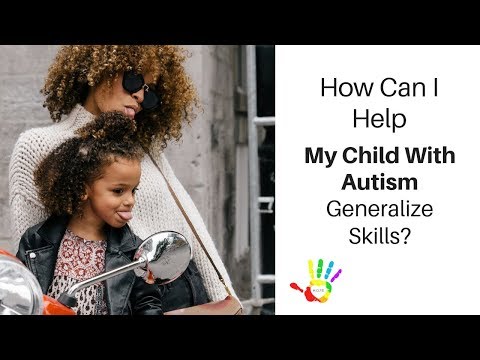In this video Jessica Leichtweisz covers the three types of generalization and how you can help your child generalize skills. <br> <h3>Auto Generated Captions</h3>
[Music]
[Applause]
[Music]
hi and welcome back to hope education
parent trainings videos on ABA tonight
I’m gonna answer a question that I was
asked by a parent and that’s what is
generalization that’s a really good
question
so generalization very simply means to
teach things in a variety of different
ways that can be really really important
for a number of reasons a lot of times
children with autism will have a hard
time with exhibiting the same behavior
in different places so whenever you’re
teaching a skill to a child you want to
make sure that they’re able to do it all
the time or else it’s not really
functional so let’s kind of give an
example let’s say you have a flash card
of a cup and you ask that child teaching
them in expressive labels you know what
is it and they learn to respond it’s a
cup well if they go to a restaurant and
they can’t figure out what the cup is
they don’t identify the cup or they
don’t know how to ask for their actual
cup in their kitchen it’s really not
that helpful
so what generalization does that make
sure that children can use skills in
many many different ways so there are
three types of generalization I’m going
to give an example of each and explain
why each is important the first is a
generalization across people so here’s
the another complaint I get from parents
my child will do things for their
therapist but they don’t do it for me
that’s what generalizations about it’s a
making sure that children respond the
same way across all people so if I were
as a therapist to ask a child a question
that the child responds the same way for
mom or dad for grandma for their brother
and sister or for their teacher in
school and this can be especially
important when it comes to compliance so
oftentimes you know will will help to
reduce a behavior like maybe for example
throwing things and it doesn’t happen in
sessions anymore but it still happens
outside of sessions with another person
well that means that
the therapist didn’t really generalize
that skill so any time before a skills
should be considered mastered you should
make sure that the child is able to do
it with multiple different people the
other one the other type to of
generalization is making sure a child
can use a skill in multiple different
settings so for example let’s say I’m
teaching a child to make a purchase and
you target it at their local corner deli
in order to buy a bottle of water well I
also want to make sure that they can buy
a bottle of water from the vendor at the
farmers market and at the local high
school football game and also at
McDonald’s and any other store that’s in
their neighborhood so if a child can
only do thing and do something in one
place it’s also not helpful a really big
part of generalization is also carrying
skills from the classroom and home
making sure that a child is able to do
things both at home in school which is
why I think it’s really important if you
have a home ABA team they were in
communication with the child’s teacher
and if they can’t be to make sure that
you as a parent are communicating and
being that liaison back and forth the
next type of generalization is
generalization across stimulus and we
touched on that a little bit with the
cup but that’s making sure that children
are able to identify different types of
the same object so for example they can
look in a in a book when they’re reading
and point to a picture of an airplane
they also can tell that thing in the sky
but they’re pointing to that’s an
airplane or you know that they can go to
Toys R Us and they see a toy airplane
and they can identify that’s an airplane
and it may seem pretty basic and pretty
simple but for children with autism it
may not be you know generalization can
be really really hard so it’s really
important to teach things in a variety
of different ways and that
generalizations are part of every single
ABA program so I hope that answers your
question about what generalization is
and thank you so much for sending the
question in if you have any additional
questions I’d love to get them answered
for you it’s my passion to get you all
the information you need to give your
child the best possible treatment and
outcome just email me at Jessica at
Jessica likewise comm and if I can I’ll
make a video for you
god bless make it a
great night and thank you so much for
watching these videos I know you have so
many things that you can be doing and
I’m honored that you’re spending your
time with me if you liked this video
please like or share it or write a
review and please if you want to
subscribe you can find us at hope
education services on YouTube and
Facebook god bless and make it a great
night
[Music]
[Music]
you
[Music]
you
How Can I Help My Child With Autism Generalize Skills? d4wp9RLe5Fw
[Music]
[Applause]
[Music]
hi and welcome back to hope education
parent trainings videos on ABA tonight
I’m gonna answer a question that I was
asked by a parent and that’s what is
generalization that’s a really good
question
so generalization very simply means to
teach things in a variety of different
ways that can be really really important
for a number of reasons a lot of times
children with autism will have a hard
time with exhibiting the same behavior
in different places so whenever you’re
teaching a skill to a child you want to
make sure that they’re able to do it all
the time or else it’s not really
functional so let’s kind of give an
example let’s say you have a flash card
of a cup and you ask that child teaching
them in expressive labels you know what
is it and they learn to respond it’s a
cup well if they go to a restaurant and
they can’t figure out what the cup is
they don’t identify the cup or they
don’t know how to ask for their actual
cup in their kitchen it’s really not
that helpful
so what generalization does that make
sure that children can use skills in
many many different ways so there are
three types of generalization I’m going
to give an example of each and explain
why each is important the first is a
generalization across people so here’s
the another complaint I get from parents
my child will do things for their
therapist but they don’t do it for me
that’s what generalizations about it’s a
making sure that children respond the
same way across all people so if I were
as a therapist to ask a child a question
that the child responds the same way for
mom or dad for grandma for their brother
and sister or for their teacher in
school and this can be especially
important when it comes to compliance so
oftentimes you know will will help to
reduce a behavior like maybe for example
throwing things and it doesn’t happen in
sessions anymore but it still happens
outside of sessions with another person
well that means that
the therapist didn’t really generalize
that skill so any time before a skills
should be considered mastered you should
make sure that the child is able to do
it with multiple different people the
other one the other type to of
generalization is making sure a child
can use a skill in multiple different
settings so for example let’s say I’m
teaching a child to make a purchase and
you target it at their local corner deli
in order to buy a bottle of water well I
also want to make sure that they can buy
a bottle of water from the vendor at the
farmers market and at the local high
school football game and also at
McDonald’s and any other store that’s in
their neighborhood so if a child can
only do thing and do something in one
place it’s also not helpful a really big
part of generalization is also carrying
skills from the classroom and home
making sure that a child is able to do
things both at home in school which is
why I think it’s really important if you
have a home ABA team they were in
communication with the child’s teacher
and if they can’t be to make sure that
you as a parent are communicating and
being that liaison back and forth the
next type of generalization is
generalization across stimulus and we
touched on that a little bit with the
cup but that’s making sure that children
are able to identify different types of
the same object so for example they can
look in a in a book when they’re reading
and point to a picture of an airplane
they also can tell that thing in the sky
but they’re pointing to that’s an
airplane or you know that they can go to
Toys R Us and they see a toy airplane
and they can identify that’s an airplane
and it may seem pretty basic and pretty
simple but for children with autism it
may not be you know generalization can
be really really hard so it’s really
important to teach things in a variety
of different ways and that
generalizations are part of every single
ABA program so I hope that answers your
question about what generalization is
and thank you so much for sending the
question in if you have any additional
questions I’d love to get them answered
for you it’s my passion to get you all
the information you need to give your
child the best possible treatment and
outcome just email me at Jessica at
Jessica likewise comm and if I can I’ll
make a video for you
god bless make it a
great night and thank you so much for
watching these videos I know you have so
many things that you can be doing and
I’m honored that you’re spending your
time with me if you liked this video
please like or share it or write a
review and please if you want to
subscribe you can find us at hope
education services on YouTube and
Facebook god bless and make it a great
night
[Music]
[Music]
you
[Music]
you
https://i.ytimg.com/vi/d4wp9RLe5Fw/hqdefault.jpg ABA,AUTISM,APPLIED BEHAVIOR ANALYSIS,APPLIED BEHAVIOUR ANALYSIS,SPECIAL EDUCATION,EDUCATION,HOPE EDUCATION SERVICES,JESSICA LEICHTWEISZ,AUTISM SPECTRUM DISORDER,ABA THERAPY,GENERALIZATION In this video Jessica Leichtweisz covers the three types of generalization and how you can help your child generalize skills.


